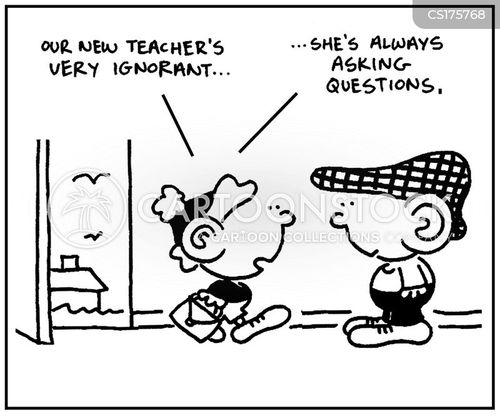Let's take a trip down memory lane... Think back to high school. Didn't it seem like your teachers asked one question after another, after another, after another, after another (you get my point!)? No, they weren't doing this to drive you nuts or to call you out on the readings that you did not do. They were asking so many questions to ensure that you were actually learning and understanding the content. Arguably, questioning is one of the most effective and quickest ways to assess lesson effectiveness and student understanding... and teachers used this to their advantage.
Questioning can be used to determine the effectiveness of objectives and teaching techniques. If a student is unable to answer a question, or provides an answer that is incorrect or off-topic, it will be obvious to the teacher that there may have been a flaw in their delivery. Furthermore, if a student is unable to perform to the standard set forth by academic standards or teacher-created objectives, the teacher can use questioning to find the lapse in understanding.
As a future educator, I see how the concepts of good objectives, concrete planning and varied teaching connect, and it is obvious that questioning plays an essential role in good instruction. Using a combination of both higher level and lower level questions allows for students to demonstrate their knowledge and for teachers to assess their teaching techniques and effectiveness.
As a future educator, I see how the concepts of good objectives, concrete planning and varied teaching connect, and it is obvious that questioning plays an essential role in good instruction. Using a combination of both higher level and lower level questions allows for students to demonstrate their knowledge and for teachers to assess their teaching techniques and effectiveness.
As I relate my AEE412 lab to the idea of questioning, I realize that I should do a better job at asking question and asking if my students have questions while I am teaching. Some of the comments that I have received from my peers have indicated that I tend to stand up there and talk "at" my students, rather than allowing them to take the stage. If I would utilize questioning more frequently, I think that this bad habit of mine would fade. I hope to improve upon this, and learn to use questioning to my full advantage.
The reading by Dyer provided me with some excellent tips on how to create effective questions that I think I could utilize in my teaching. Some of my favorite hints included: calling on students using their names, avoid repeating all student's questions, not praising all answers, praising students who do not participate more than students who overly-participate. I think that these are all smart techniques, which can help me utilize questions in my future classroom.
In conclusion, I hope to be able to improve on my questioning techniques in order to become a more effective teacher. As a future educator, I certainly see the value in questioning, even though I might not have in high school!
The reading by Dyer provided me with some excellent tips on how to create effective questions that I think I could utilize in my teaching. Some of my favorite hints included: calling on students using their names, avoid repeating all student's questions, not praising all answers, praising students who do not participate more than students who overly-participate. I think that these are all smart techniques, which can help me utilize questions in my future classroom.
In conclusion, I hope to be able to improve on my questioning techniques in order to become a more effective teacher. As a future educator, I certainly see the value in questioning, even though I might not have in high school!

No comments:
Post a Comment